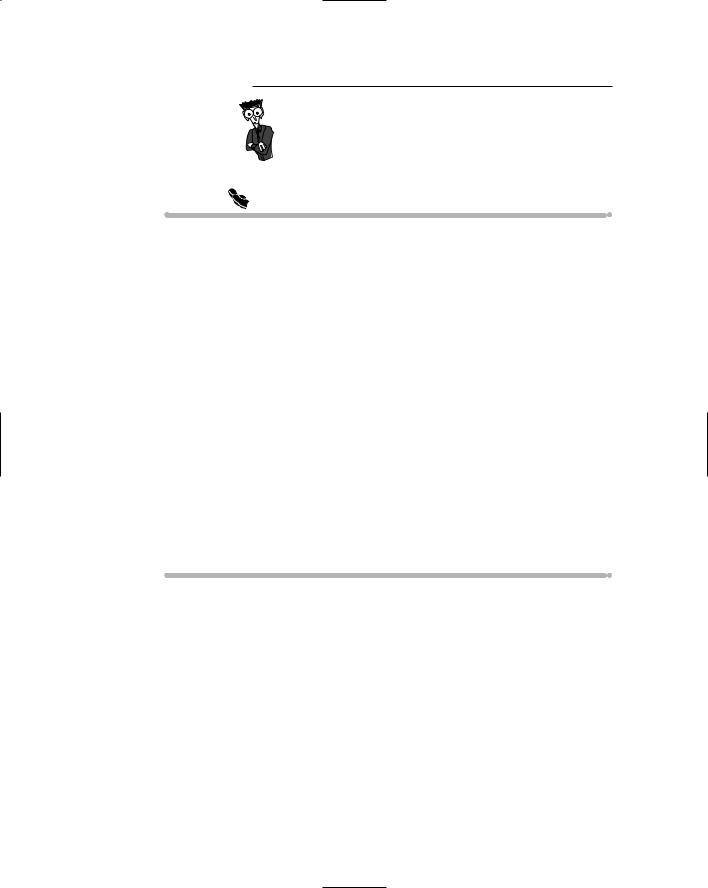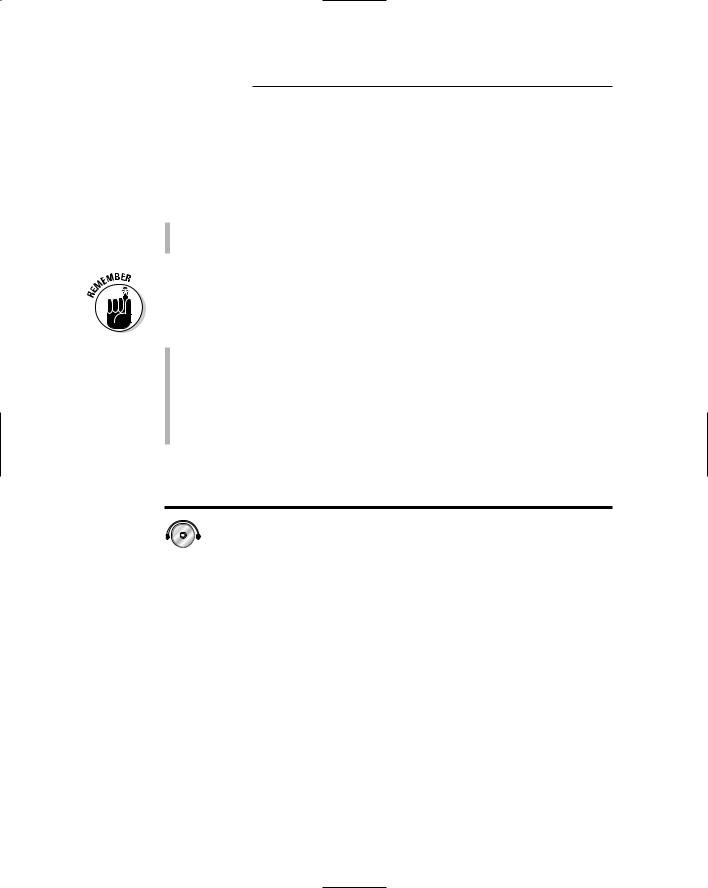
Arabic_for_Dummies
.pdf
166 Part II: Arabic in Action
 Fun & Games
Fun & Games
Here are some questions commonly asked on the phone. Match the questions with the appropriate answers.
‘as-’ila (ass-ee-lah; questions)
1.mataa sa-tarj’u? (When will she be back?)
2.hal ‘induka waqt faarigh? (Do you have free time?)
3.hal huwa hunaa? (Is he here?)
4.kayf al-Haal? (How are you doing?)
5.maa ‘ismuk? (What’s your name?)
al-jawaab (al-jah-waab; answers)
A.na’am. daqiiqa min faDlik.
B.laa. ‘anaa mashghuul.
C.‘ismii Souad.
D.al-Hamdu li-llah, shukran.
E.sa-tarju’ ba’da saa’a.
The answers are in Appendix C.

Chapter 10
At the Office and Around
the House
In This Chapter
Finding a job that’s right for you
Interacting with co-workers
Using the imperative verb form
Relaxing in your home
If you’re like most people living in the modern world, the two places where you spend the most time probably are your manzil (man-zeel; house) and
your maktab (mak-tab; office). Like many people who are employed by big companies, small businesses, government agencies, or private ventures, you divide your waqt (wah-ket; time) between al-’amal (al-ah-mal; work) and
Hayaat al-‘aa’iliiyya (hah-yat al-ah-ee-lee-yah; family life). Achieving tawaazun
(tah-wah-zoon; balance) between the two is extremely crucial for your happiness, your efficiency at the workplace, and your effectiveness in your home. In this chapter, I cover all the good “work” words you should know and introduce you to all aspects of life at the office and around the house to help you balance life between these two worlds.
Landing the Perfect Job
At some point in your Hayaat (hah-yat; life), you may want or need to start working and therefore decide to actively start looking for ‘amal. Identifying a mihna (meeh-nah; profession) that’s right for you and then going about securing ‘amal can be a full-time job itself. In this section, you discover the words and phrases to make your job search as efficient as possible!

168 Part II: Arabic in Action
One of the first things to keep in mind when you go about your job search is that you need to find an ‘amal that suits your particular maSlaHaat (mas-lah- hat; interests) and mahaaraat (mah-hah-rat; skills). You may want to start your search by talking to ‘aSdiqaa’ (ass-dee-kah; friends) or asking around at your local jam’iyya (jam-ee-yah; university). Also, you’re likely to find listings in the following:
jariidaat (jah-ree-dat; newspapers)
ma’luumaat (mah-loo-mat; classified ads)
As you search, make sure you find out as much as possible about a potential mustakhdim (moos-tak-deem; employer). When you’re able to secure an interview with a sharika (shah-ree-kah; company), here’s a list of things you may want to find out about your potential mustakhdim:
‘adad al-‘ummaal (ah-dad al-oo-mal; number of employees)
Damaan aS-SaHHa (dah-man ah-sah-hah; health insurance)
raatib (rah-teeb; salary)
waqt al-‘uTla (wah-ket al-oot-lah; vacation time)
ta’aaqud (tah-ah-kood; pension)
Talkin’ the Talk
Mark has been looking for a job and has landed a job interview with Mary, a head of human resources. Mark goes in for his interview with Mary.
Mary: marHaban bika. tafaDDal min faDlik. mar-hah-bah bee-kah. tah-fah-dal meen fad-leek.
Welcome. Please come in.
Mark: shukran li ‘istiqbaalii. shook-ran lee ees-teek-bah-lee.
Thank you for having me.
Mary: khuz maq’ad min faDlik. kooz mak-ad meen fad-leek.
Please have a seat.
Mark: shukran. shook-ran.
Thank you.

Chapter 10: At the Office and Around the House 169
Mary: hal turiidu ‘an tashraba shay’an?
hal too-ree-doo an tash-rah-bah shay-an?
Would you like anything to drink?
Mark: maa’ min faDlik. mah meen fad-leek.
Water please.
Mary: hal ‘indaka ‘as’ila ‘an haadhihi al-waDHiifa? hal een-dah-kah ass-ee-lah an hah-zee-hee al-wah-dee-fah?
Do you have any questions about this position?
Mark: na’am. kam min ‘ummaal fii ash-sharika? nah-am. kam meen oo-mal fee ah-shah-ree-kah?
Yes. How many employees are in the company?
Mary: ‘indanaa ‘ishriin ‘ummaal wa mudiir waaHid. een-dah-nah eesh-reen oo-mal wah moo-deer wah-heed.
We have 20 employees and one director.
Mark: hal ash-sharika tuqaddim Damaan aS-SaHHa? hal ah-shah-ree-kah too-kah-deem dah-man ah-sah-hah?
Does the company provide health insurance?
Mary: na’am. nuqaddim Damaan aS-SaHha li kul muwaDHaf ba’da muddat thalaath ‘ashhur fii al-’amal.
nah-am. noo-kah-deem dah-man ah-sah-hah lee kool moo-wah-daf bah-dah moo-dat thah-lath ash-hoor fee al-ah-mal.
Yes. We provide health insurance to every employee after a period of three months on the job.
Mark: raai’! wa hal hunaaka waqt li al-’uTla? rah-eeh! wah hal hoo-nah-kah wah-ket lee al-oot-lah?
Great! And is there any vacation time?
Mary: Taba’an. hunaaka ‘ishriin yawm li al-’uTla fii as-sana al-’uulaa. wa fii as-sana ath-thaaniya hunaaka thalaathiin yawm li al-’uTla.

170 Part II: Arabic in Action
tah-bah-an. hoo-nah-kah eesh-reen yah-oum lee al- oot-lah fee ah-sah-nah al-oo-lah. wah fee ah-sah-nah ah-thah-nee-yah hoo-nah-kah thah-lah-theen yahoum lee al-oot-lah.
Of course. There are 20 days for vacation during the first year. And then during the second year there are 30 vacation days.
Mark: shukran jaziilan li haadhihi al-ma’luumaat.
shook-ran jah-zee-lan lee hah-zee-hee al-mah-loo-mat.
Thank you very much for this information.
Words to Know
‘istiqbaal |
ess-teek-bal |
host |
maq’ad |
mak-ad |
seat |
‘as’ila |
ass-ee-lah |
questions |
waDHiifa |
wah-dee-fah |
position |
taqdiim |
tak-deem |
offering |
tuqaddim |
too-kah-deem |
to offer |
‘ashhur |
ash-hoor |
months |
ma’luuma |
mah-loo-mah |
information (S) |
ma’luumaat |
mah-loo-mat |
information (P) |
Managing the Office Environment
The maktab is an essential part of modern life. In most Arabic-speaking and Muslim countries, ‘ummaal (ooh-mal; workers) work from al-‘ithnayn (al-eeth- nah-yen; Monday) until al-jumu’a (al-joo-moo-ah; Sunday). Most ‘ummaal follow a standard as-saa’a at-taasi’a ‘ilaa al-khaamisa (ah-sah-ah ah-tah-see-ah ee-lah al-kah-mee-sah; 9:00 to 5:00) schedule for workdays.

Chapter 10: At the Office and Around the House 171
Although most makaatib (mah-kah-teeb; offices) around the world give their ‘ummaaal time for ghadaa’ (gah-dah; lunch), the duration depends on the employer and the country. For example, in the United States, it’s not uncommon for an ‘aamil (ah-meel; worker) to eat her ghadaa’ while sitting at her maktab (mak-tab; desk). On the other hand, in most Middle Eastern countries, an ‘aamil gets two hours for ghadaa’ and is encouraged to eat his ghadaa’ at his manzil (man-zeel; house) with his ‘usra (oos-rah; family).
Here are some key words and terms to help you navigate the workplace:
‘amal (ah-mal; work/job)
mihna (meeh-nah; profession)
sharika (shah-ree-kah; company)
sharika kabiira (shah-ree-kah kah-bee-rah; large company)
sharika Saghiira (shah-ree-kah sah-gee-rah; small company)
ma’mal (mah-mal; factory)
zubuun (zoo-boon; client)
zabaa’in (zah-bah-een; clients)
You can choose from many different kinds of sharikaat (shah-ree-kat; companies) to work for, including a maSraf (mas-raf; bank), a sharikat al-Hisaab
(shah-ree-kat al-hee-sab; accounting firm), and a sharikat al-qaanuun (shah- ree-kat al-kah-noon; law firm). You also have many choices when it comes to mihan (mee-han; professions). Here are some popular mihan:
maSrafii (mas-rah-fee; banker) (M)
maSrafiiya (mas-rah-fee-yah; banker) (F)
rajul al-‘a’maal (rah-jool al-ah-mal; businessman)
‘imra’at al-‘a’maal (eem-rah-at al-ah-mal; businesswoman)
muHaamiiy (moo-hah-mee; lawyer)
shurTa (shoor-tah; police officer)
rajul al-‘iTfaa’ (rah-jool al-eet-fah; firefighter)
Most sharikaat have a lot of ‘ummaal with different responsibilities, and most ‘ummaal find themselves in daa’iraat (dah-ee-rat; divisions/groups/ departments) within the sharika. Here are some of the common daa’iraat you may find in a sharika:

172 Part II: Arabic in Action
daa’irat al-Hisaab (dah-ee-rat al-hee-sab; accounting department)
daa’irat al-‘aswaaq (dah-ee-rat al-as-wak; marketing department)
daa’irat al-qaanuun (dah-ee-rat al-kah-noon; legal department)
daa’irat al-’ummaal (dah-ee-rat al-ooh-mal; human resources department)
daa’irat az-zabaa’in (dah-ee-rat ah-zah-bah-een; customer service department)
Interacting with your colleagues
Unless you’re in a mihna that doesn’t require you to interact with people face-to-face (such as being an author), you need to be able to get along with your zumalaa’ (zoo-mah-lah; colleagues) at the maktab. This section reveals the terms that will help you get along with everyone at the office so that you can be as productive and efficient as possible.
Before you build good working relationships with your zumalaa’, you should know the right words for classifying them:
zamiil (zah-meel; colleague) (MS)
zamiila (zah-mee-lah; colleague) (FS)
zumalaat (zoo-mah-lat; colleagues) (FP)
mudiir (moo-deer; director) (MS)
mudiira (moo-dee-rah; director) (FS)
mudiiruun (moo-dee-roon; directors) (MP)
mudiiraat (moo-dee-rat; directors) (FP)
ra’iis (rah-ees; president) (MS)
ra’iisa (rah-ee-sah; president) (FS)
ru’asaa’ (roo-ah-sah; presidents) (MP)
ru’asaat (roo-ah-sat; presidents) (FP)
Whether you like it or not, your zumalaa’ al-maktab (zoo-mah-lah al-mak-tab; office colleagues) have a big influence over your time at the maktab; therefore, getting along with your zumalaa’ is crucial. You can address people you work with in a number of different ways, such as based on rank, age, or gender. These categorizations may seem discriminatory in an American sense, but these terms actually carry the utmost respect for the person being referenced:

Chapter 10: At the Office and Around the House 173
Use sayyidii (sah-yee-dee; sir) to address the mudiir or someone with a higher rank than you.
Use sayiidatii (sah-yee-dah-tee; madam) to address the mudiira or ra’iisa.
Use Sadiiqii (sah-dee-kee; friend) to address a male colleague.
Use Sadiiqatii (sah-dee-kah-tee; friend) to address a zamiila.
Use al-‘akh (al-ak; brother) to address a co-worker or colleague.
Use al-‘ukht (al-oo-ket; sister) to address a zamiila.
In Arabic culture, it’s okay to address co-workers or people close to you as ‘akh (brother) or ‘ukht (sister) even though they may not be related to you.
Here are some phrases to help you interact cordially and politely with your zumalaa’:
hal turiid musaa’ada? (hal too-reed moo-sah-ah-dah; Do you need help?) (M)
hal turiidiina musaa’ada? (hal too-ree-dee-nah moo-sah-ah-dah; Do you need help?) (F)
hal yumkin ‘an ‘usaa’iduka bii dhaalika? (hal yoom-keen an oo-sah-ee- doo-kah bee zah-lee-kah; May I help you with that?) (M)
hal yumkin ‘an ‘usaa’idukii bii dhaalika? (hal yoom-keen an oo-sah-ee- doo-kee bee zah-lee-kah; May I help you with that?) (F)
sa ‘adhhab ‘ilaa al-maT’am. hal turiid shay’an? (sah az-hab ee-lah al-mat-ham. hal too-ree-doo shay-an; I’m going to the cafeteria. Do you want anything?) (M)
sa ‘adhhab ‘ilaa al-maT’am. hal turiidiina shay’an? (sah az-hab ee-lah al-mat-ham. hal too-ree-dee-nah shay-an; I’m going to the cafeteria. Do you want anything?) (F)
‘indanaa ‘ijtimaa’ fii khams daqaa’iq. (een-dah-nah eej-tee-mah fee kah-mes dah-kah-eek; We have a meeting in five minutes.)
az-zabuun saya’tii fii saa’a. (ah-zah-boon sah-yah-tee fee sah-ah; The client will arrive in one hour.)
hal waSaluka bariidii al-‘iliktroonii? (hal wah-sah-loo-kah bah-ree-dee al-ee-leek-troo-nee; Did you get my e-mail?)
hal waSaluka khabaarii al-haatifiiy? (hal wah-sah-loo-kah kah-bah-ree al-hah-tee-fee; Did you get my phone message?)
hal ‘indaka qalam? (hal een-dah-kah kah-lam; Do you have a pen?) (M)
hal ‘indukii qalam? (hal een-doo-kee kah-lam; Do you have a pen?) (F)

174 Part II: Arabic in Action
Talkin’ the Talk
Omar and Samir are colleagues working on a project at the office.
Omar: hal katabta at-taqriir?
hal kah-tab-tah ah-tak-reer?
Did you write the report?
Samir: ‘anaa katabtu niSf at-taqriir, wa laakin ‘uriidu musaa’adatuka li kitaabatuh.
ah-nah kah-tab-too nee-sef ah-tak-reer, wah lah-keen oo-ree-doo moo-sah-ah-dah-too-kah lee kee-tah-bah-tooh.
I wrote half of the report, but I need your help to finish writing it.
Omar: Tayyib, hayyaa binaa li al-’amaal. ‘ayna turiidu ‘an na’mal?
tah-yeeb, hay-yah bee-nah lee al-ah-mal. ay-nah too-ree-doo an nah-mal?
Okay, let’s get to work. Where would you like us to work?
Samir: hayya binaa ‘ilaa qaa’at al-’ijtimaa’.
hay-yah bee-nah ee-lah kah-at al-eej-tee-mah.
Let’s go to the conference room.
Omar and Samir head to the conference room to finish the report.
Omar: hal turiidu haadhihi aS-Suura fii bidaayat ‘aw nihaayat at-taqriir?
hal too-ree-doo hah-zee-hee ah-soo-rah fee bee-dah- yat aw nee-hah-yat ah-tak-reer?
Do you want this illustration in the beginning or end of the report?
Samir: ‘aDHunnu fii bidaayat at-taqriir ‘aHsan. ah-zoo-noo fee bee-dah-yat ah-tak-reer ah-san.
I believe in the beginning of the report is better.
Omar: hal naziid SafHa ‘ukhraa ‘aw haadhaa kaafiiyan? hal nah-zeed saf-hah ook-rah aw hah-zah kah-fee-yan?
Should we add another page or is this enough?

Chapter 10: At the Office and Around the House 175
Samir: haadhaa kaafiyan li al-’aan. hah-zah kah-fee-yan lee al-an.
This is enough for now.
Omar: mataa turiidu ‘an nufarriqa haadhaa at-taqriir? mah-tah too-ree-doo an noo-fah-ree-kah hah-zah ah-tak-reer?
When would you like to distribute this report?
Samir: ‘indanaa ‘ijtimaa’ fii saa’a. yajib ‘an yakuun at-taqriir jaahiz li al-’ijtimaa’.
een-dah-nah eej-tee-mah fee sah-ah. yah-jeeb an yah-koon ah-tak-reer jah-heez lee al-eej-tee-mah.
We have a meeting in one hour. The report must be ready in time for the meeting.
Omar: sa yakuun jaahiz fii niSf saa’a. kam min nuskha yajib
‘an naTba’?
Sah yah-koon jah-heez fee nee-sef sah-ah. kam meen noos-kah yah-jeeb an nat-bah?
It’ll be ready in half an hour. How many copies do we need to print?
Samir: sa yakuun ‘ashra mumathiliin fii al-’ijtimaa’, wa laakin ‘iTba’ khamsat nuskhaat ‘iDHaafiyya. sah yah-koon ash-rah moo-mah-thee-leen fee al-eej-tee-mah, wah lah-keen eet-bah kam-sat noos-kat ee-dah-fee-yah.
There will be ten representatives at the meeting, but print five additional copies just in case.
Omar: fawran. hal hunaaka shay’un ‘aakhar? faw-ran. hal hoo-nah-kah shay-oon ah-kar?
Right away. Is there anything else?
Samir: na’am. ‘i’lam kaatibatii min faDlik ‘an ta’khudh mukaalamat al-haatifiyya li ‘annanii sa ‘akuun fii al-’ijtimaa’.
nah-am. eeh-lam kah-tee-bah-tee meen fad-leek an tah-kooz moo-kah-lah-mat al-hah-tee-fee-yah lee ah-nah-nee sah ah-koon fee al-eej-tee-mah.
Yes. Please inform my assistant to hold all my calls because I’ll be at the meeting.
Omar: sa ‘aquulu lihaa dhallika al-’aan.
sah ah-koo-loo lee-hah zah-lee-kah al-an.
I will tell her that right now.
